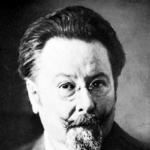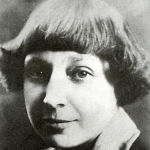Background
Sergei Mikhailovitch Volkonsky was born on May 4, 1860, in Tallinn, Estonia.

Sergei Mikhailovitch Volkonsky was born on May 4, 1860, in Tallinn, Estonia.
Sergei Mikhailovitch graduated from the philological faculty of Saint Petersburg University in 1884.
In the spring of 1893, Sergei Mikhailovitch attended the World's Columbian Exposition in Chicago as an official representative of the Department of Public Instruction, and an article by him about it was published later on in Vestnik Evropy (The European Bulletin). Later that year he went on a world cruise before returning to Petersburg via Constantinople. In the mid-1890s, he delivered lectures on Russia at Cornell and Harvard.
In 1899 Sergei Mikhailovitch became Director of the Imperial Theaters, the post for which he is most remembered. Although he held the position only until 1902, he achieved a great deal; Serge Diaghilev was his immediate assistant, and Sergei Mikhailovitch entrusted him with the publication of the Annual of the Imperial Theaters in 1900. New names appeared in the theaters, such as painters Alexandre Benois, Konstantin Somov, and Léon Bakst. Sergei Mikhailovitch was forced to send in his resignation after the conflict with Mathilde Kschessinskaya.
In 1910 Sergei Mikhailovitch trained in and taught eurhythmics with Émile Jaques-Dalcroze, influencing Stanislavski's work on "tempo-rhythm", as well as the Delsarte method of gestures and movements, and he began to publish articles publicizing them in Russia. These works aroused the interest of Constantin Stanislavski, with whom he briefly collaborated. He set up a school and journal to propagate his ideas, but the advent of World War I in 1914 put an end to them, and he retired to his estate in Tambov province until 1918.
After the October Revolution, Sergei Mikhailovitch taught the acting technique in Moscow for a time, but in the spring of 1919 he contracted typhus, and in August he was arrested by the Cheka. He was released and continued teaching and giving lectures, working for a time with Proletkult and Proletcult Theatre, but eventually, he emigrated.
From February 1926 Sergei Mikhailovitch lived in Paris, where he became a leading theatrical critic; he also continued teaching and giving lectures. Sergei Mikhailovitch became the first director of established in 1931 Conservatoire Rachmaninoff in Paris. During this time he became "a close friend and associate of the poet Marina Tsvetaeva (who dedicated to him her cycle of poems The Disciple and wrote an essay about his memoirs)." In 1936 he was invited by the Kurt Jooss ballet school in London, after which he taught in the ballet company of Alicia Markova and Anton Dolin. In this city, Sergei Mikhailovitch met the woman he married, Mary Walker Fearn, daughter of United States diplomat J. Walker Fearn and (by her first marriage) a sister-in-law of the former Mrs. Elsie French Vanderbilt. After the marriage, Prince and Princess Wolkonsky went to the United States, and there in the town of Hot Springs, Virginia he died after a brief illness. On 31 October, a requiem was held in a Russian Catholic church, and "besides relatives, there was all Russian Paris." He was buried in Richmond, Virginia.
During the realm of Tsar Alexander III Sergei Mikhailovitch converted to the Russian Greek Catholic Church from Russian Orthodoxy.
Mikhail Sergeevich was a son of Decembrist Sergei Volkonsky and Mary, née Raevskaya; his godfather was Pushkin's friend Ivan Pushchin, another Decembrist. From his birth, Mikhail was registered as a serf, and as the son of a deportee wasn't allowed to enter the University, but in 1855, just after the death of Emperor Nicholas I, he reached Russia from Siberia, and by the 1870s had become a member of the State Council.
Princess Elizaveta Grigorievna Volkonskaya was the daughter of Grigory Petrovich Volkonsky (son of Sophia, a sister of Decembrist Sergei Volkonsky) and Mary (née Countess Benckendorff, daughter of Count Alexander Benckendorff). Princess Elizaveta Grigorievna profoundly influenced her son Serge, defining many of his interests, including his Orthodox religious views. Among her friends was the well-known Russian philosopher, theologian, and poet Vladimir Solovyov.


